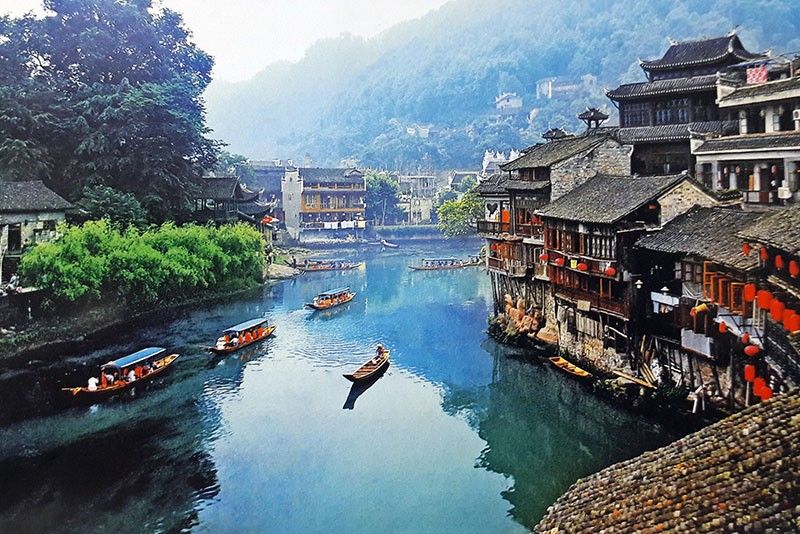The town where the Phoenix came to live

MANILA, Philippines - China has found a tourism gold mine in revitalizing its old towns, creating tourist havens by restoring, refurbishing and repurposing ancient communities and turning them into showcases of a way of life from the past.
Probably the best example of this is Lijiang in northwestern Yunnan province, declared a UNESCO World Cultural Heritage site. The 6,500-year-old Wuzhen, in the lower reaches of the Yangtze River, is one of six ancient water towns and is often called the Venice of the East. These old towns give glimpses of what life was like in days gone by, and showcase as well each area’s unique traditions, cuisine, arts and crafts.
On the western boundary of Hunan province, legend has it that a phoenix (feng huang) descended from the lush mountains and found the area so beautiful she settled in what became Feng Huang county along the Tuo River. Today Feng Huang is divided into the new and old towns, the former populated by medium- and high-rise concrete buildings, the latter with old structures successfully adapted to touristic use.
The spirit of the mythical bird – symbol of good omen and longevity as it is consumed by fire but is always re-born from the flames – is embodied in old Feng Huang, an ancient settlement that dates back to the Spring and Autumn Period (770 to 476 BC). The structures existing today, however, were built around 1704 during the reign of Emperor Kangxi of the Qing Dynasty. While Feng Huang has become a very popular destination for Chinese and, increasingly, foreign tourists, life for those living in the ancient town is still the same in many ways.
The Tuo River – stretching diagonally from northwest to southeast of the town – remains a life force for the local people. Men go out on the river with their nets to fish, while women prepare food and wash clothes on the river banks as they have for centuries. These days, the boats also ferry visitors up and down the river for sightseeing.
The houses by the river are built on stilts to guard against floods when the Tuo River is swelled by the spring rains. In the town, alleyways paved with flagstones weave among gabled wooden houses bearing distinctive Qing architectural details. Several old stone bridges span the Tuo River. Scattered among the houses are a few pagodas and towers whose purpose and provenance are described by some as “mysterious.” There are also a couple of lovely old gardens that add to the town’s natural charm.
Many of these old houses, especially those by the river, have been repurposed into restaurants, pubs and bars that come alive at night. Others are shops selling curios and souvenirs (there is one shop selling all sizes of musical instruments made from gourds, and the old shopkeeper played us a tune when we stopped in to look) and local delicacies like ginger sugar (a specialty), candied kiwi (the fruit is grown locally in abundance), sesame and peanut candies (the latter pounded with heavy stone mallets by shopkeepers) and their signature fiery red chillies in many forms – dried, flakes, steeped in oil, etc.
Interesting as the town is – and you can spend a whole day and night exploring the town’s myriad charms – there is more to Feng Huang than touristic dining and shopping. The town claims some famous sons, including Xiong Xiling, a philanthropist who served as the first premier of the Republic of China after the fall of the Manchu. He was also the first president of the China Red Cross.
A visit to the old home of writer Shen Congwen (1902-1988) is a must, for he is probably Feng Huang’s most famous son, twice nominated for the Nobel Prize in Literature – first in 1980 and then again in 1988, when he was slated to get the prize but died before he could be awarded the honor. His short novel “Border Town,” a love story set in Feng Huang, is known to every family here and was made into a movie in 1984. A short story, “Xiaoxiao” about a child bride in rural Hunan was twice (in the 1950s and remade in 1986) made into films and shown at the Cannes Film Festival in 1987.
Among the items on display in his spacious home are an old phonograph (he enjoyed listening to music while he wrote), a copy of his major research work on old Chinese clothes and costumes, and his brush, ink, inkstone and paper, known as the “four treasures of a scholar.”
Similarly outstanding is artist Huang Yongyu (born 1924), an acclaimed contemporary painter in the traditional Chinese style. Visitors can view a collection of his works at the Hongqiao Art Building. Huang is known for his woodblock prints and ink paintings, especially long (stretching several meters), scroll-like works, but he has also published poems, essays, novels and screenplays. Scenes from Feng Huang figure prominently in his paintings. He spent years in Italy (“like going home,” he said) but now lives in Beijing with a menagerie of pets. His works command hefty prices at auction, up to RMB600,000 (about $87,000) per square meter!
It is most pleasant to explore Feng Huang ancient town at night, which we did on a full moon night. Young and old, families with little kids and grandparents, rowdy groups of bagets… the promenade on both sides of the river as well as the bridges and alleyways were crowded.
Standing on a bridge looking out over the town bathed in moonlight, we could certainly see why the mythical bird chose to settle here.
Feng Huang has no train station, but visitors can take a train from Changsha, Hunan’s capital, to nearby towns Jishou or Huaihua and hop on a bus from there.



















